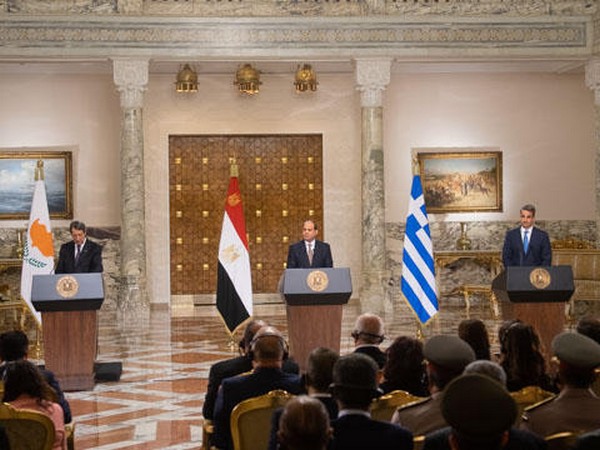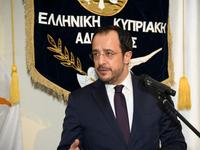Press Releases

09-10-2019 14:21
Joint Declaration of the 7th Egypt – Cyprus – Greece Trilateral Summit, Cairo, October 8th, 2019
H.E. Abdel Fattah Elsisi, the President of the Arab Republic of Egypt, H.E. Nicos Anastasiades, the President of the Republic of Cyprus and H.E. Kyriakos Mitsotakis, the Prime Minister of the Hellenic Republic met in Cairo, Egypt, on October 8th, 2019, in the framework of trilateral cooperation and coordination between the three countries. They discussed a broad range of issues and stressed the importance of enhancing their efforts in promoting peace, stability, security and prosperity in the eastern part of the Mediterranean.
The Heads of State and Government reviewed the latest stance of the ambitious and ongoing cooperation mechanism, which is considered as an important milestone in the relations between the three countries and the progress achieved in sectoral cooperation, inter alia, in the fields of defense and security, energy, investments, tourism, Diaspora, protection of the environment, protection of cultural heritage, research and innovation and education. They stressed on the strategic nature and great importance of strengthening this political coordination and economic cooperation, and reaffirmed the strong historic ties and rich cultural heritage that the three countries share, which represent a unique universal legacy for all humanity.
The Heads of State and Government reemphasized the necessity of enhancing international efforts in combating the spread of terrorism and extremism, and urged the international community, in particular the United Nations, to take further actions, commensurate with international law, against all terrorist groups regardless of their forms and ideologies, as well as taking concrete actions and measures to hold accountable the regional actors who provide terrorist groups with funds, weapons, foreign terrorist fighters, safe heavens, incitement and media outlets, in clear violation to the relevant Security Council resolutions. They also highlighted the negative impact of terrorism on the enjoyment of all human rights, in particular the right to life, liberty and security of persons.
The Heads of State and Government expressed their deep concern over the deteriorating situation in Libya and stressed that reaching a comprehensive political settlement is the sole mean to resolve this strife and restore stability in Libya. In this context, they reaffirmed their support for the UN Special Representative of the Secretary-General Ghassan Salamé’s efforts, and stressed that UN-led initiatives brought forth by Mr Salamé, and particularly the Action Plan for Libya, constitute a solid basis for achieving progress. They expressed also their commitment to the unity, sovereignty, and territorial integrity of the Libyan state, and rejected all kinds of foreign intervention in Libyan affairs, as well as the violations of the resolutions of the United Nations, such as the UNSC Resolutions 1970/2011 and 1973/2011 and 2441/2018, by parties that export arms, military equipment, and facilitate the transfer of foreign terrorist fighters into Libya.
On Syria, the Heads of State and Government expressed their commitment to the unity, sovereignty, territorial integrity, independence of the Syrian state. They further emphasized support to international endeavors as defined by UNSCR 2254 and the Geneva Communiqué, which enhance the political solution of the conflict in an inclusive way. In this respect, they reaffirmed their support to the UN Special Envoy, Geir O. Pedersen, and emphasized the need for resuming the negotiations between the Syrian parties, and the activation of the constitutional committee immediately. They also expressed their serious concern over the situation in Idlib with the presence of thousands of terrorists whom are being assisted by specific parties, which represent a common threat to both sides of the Mediterranean.
The Heads of State and Government expressed deep concern over the alarming Turkish declaration concerning an illegal and illegitimate military operation in Syrian territories, and emphasized the need to preserve Syria's unity and demographic and territorial integrity, and strongly condemned any Turkish attempt to undermine it or undertake any deliberate demographic changes in Syria.
On the Palestinian issue, the Heads of State and Government reiterated that a need to achieve a comprehensive, just and lasting peace in the Middle East based on a two state solution, in accordance with the relevant U.N. General Assembly and Security Council Resolutions, and the establishment of a sovereign, viable and contiguous Palestinian State within the 1967 borders with East Jerusalem as its capital, living in peace with all its neighbors. They also stressed that a two-state solution is the only solution that responds satisfactorily to Israeli and Palestinian security needs and to Palestinian aspirations.
The Heads of State and Government reiterated their unwavering support to the efforts of the Government of the Republic of Cyprus to reach a comprehensive, just and viable solution to the Cyprus problem based on the relevant U.N. Security Council Resolutions, and international law. They called on Turkey to terminate its provocative actions and to contribute constructively and in concrete terms for the resumption of structured and result oriented negotiations for a comprehensive and sustainable settlement of the Cyprus problem on the basis of the relevant UN Security Council Resolutions. Such a solution must be compatible with the Republic of Cyprus’ capacity as an EU member state and fully safeguard its independence, sovereignty, territorial integrity and security. To this end, the termination of the anachronistic security arrangements and the withdrawal of foreign forces remain a sine qua non for the Republic of Cyprus as a sovereign state. They stressed that the United Nations remains the only framework through which a settlement can be achieved.
The Heads of State and Government expressed their grave concern regarding the current escalation within the maritime zones in the eastern part of the Mediterranean Sea, in particular, they strongly condemned Turkey’s ongoing actions in Cyprus’ Exclusive Economic Zone and territorial waters, which violate international law, as well as new attempts to illegally conduct drilling operations in Cyprus’ EEZ/continental shelf, in marine areas already delimited, in accordance with international law. They expressed their concern over increased militarization of the area that threatens the wider stability, peace and security in the Mediterranean Sea. They stressed the importance for the respect of the sovereignty and the sovereign rights of each state in its maritime zones in accordance with international law, and as reflected in the UN Convention on the Law of Sea (UNCLOS) and called for the immediate termination of all illegal exploration activities. Furthermore, the Heads of State and Government condemned violations of Greek national airspace and territorial waters in the Aegean Sea, in contravention of international law. They also emphasized the universal character of the UNCLOS and the importance to proceed expeditiously with the negotiations on the delimitation of their common maritime boundaries, as appropriate.
The Heads of State and Government expressed their desire to continue strengthening their cooperation through a series of agreements on the exploration and transfer of natural gas, which further highlights the fact that the discovery of hydrocarbons reserves can serve as a catalyst for regional stability and prosperity. In this regard, they welcomed the announcement of the establishment of the East Mediterranean Gas Forum (EMGF) to be located in Cairo as an important mechanism to coordinate gas policies, and align the energy sector with sustainable development, which is of pivotal importance to the regions stability, and agreed to intensify and conclude discussions to elevate the EMGF to the level of a regional organization. To this end, they recognized the importance of establishing an electrical grid between Egypt, Cyprus and Greece, such as the framework agreement between the Egyptian Electricity Holding Company and the Euro Africa Interconnector Company on 22 May 2019.
The Heads of State and Government discussed the recent developments on the negotiations on the Grand Ethiopian Renaissance Dam. They expressed deep concern that the talks between Egypt, Ethiopia and the Sudan have reached a deadlock, and underscored that after eight years of direct negotiations without palpable results, an effective international role is needed to overcome the current stalemate in negotiations, bring the views of the three countries closer, and to reach a fair and balanced agreement.
The Heads of State and Government reiterated that previous agreements, especially the 2015 Declaration of Principles which requires Egypt, Ethiopia and the Sudan to reach an agreement on filling and operation of the Grand Ethiopian Renaissance Dam (GERD) should be upheld and the obligation not to cause significant harm and the principle of equitable and reasonable utilization should remain the foundation for reaching a fair and balanced agreement.
The Heads of State and Government underlined the importance of preserving and protecting the cultural heritage of the Mediterranean and the Middle East regions, and emphasized their resolve to counter illicit trafficking in cultural property. In the same vein, they called for further steps to prevent and prohibit illicit trade in cultural property, including property deriving from areas under armed conflict in the Middle East and encourage UNESCO’s efforts to help put in place a ban on illicit trade and support the restitution of these properties. The Heads of State and Government also reiterated their determination to address the issue of the protection of underwater cultural heritage in the eastern part of the Mediterranean from illicit excavations and damage that might be caused by other activities, through the elaboration of an Agreement.
The three countries share historic ties which bind one to the other, inter alia, their Diaspora. The Heads of State and Government agreed to further develop cooperation through the implementation of specific initiatives involving the Diaspora with emphasis on remittances, labor and market participation, business, investment, trade and charity, tourism, culture, youth and continue actions under the NOSTOS program.
The Heads of State and Government expressed their determination to work together towards achieving an enhanced mutually beneficial EU-Egypt Partnership and a stronger strategic engagement in areas of common interests, building on the momentum created by the first EU-League of Arab States Summit held in February 2019 in Egypt. They also reiterated the importance of the Union for the Mediterranean as a vehicle for intensifying the cooperation between the two shores of the Mediterranean, within the framework of the Southern Dimension of the European Neighborhood Policy.
The Heads of State and Government acknowledged the achievements attained during Egypt’s Presidency of the African Union in 2019, and welcomed the launching of the operational phase of the African Continental Free Trade Area in July 2019, and recognized the ambitious role that the Suez Canal economic zone could play in paving the way for wider economic opportunities between Africa and Europe.
In light of what was agreed upon in Crete 2018 on the establishment of a Permanent Secretariat in Nicosia for the trilateral partnership between Egypt, Cyprus and Greece, the Heads of State and Government agreed to intensify and conclude discussions on the implementation of this stepping-stone towards wider horizons of cooperation that preserve the uniqueness of the relations between the three countries.
The Heads of State and Government emphasized the shared responsibilities of the “international partners” in addressing the root causes of illegal migration including socio-economic dimensions and the security prospective. Furthermore, they recognized the potential areas of cooperation regarding the phenomenon of migration including labour migration given the demographic trends on the two shores of the Mediterranean. They also emphasized the achievements attained by Egypt in aborting all attempts of illegal migration across its shores since September 2016 while dealing with other dimensions of the issue from a comprehensive approach through national strategies for combating illegal migration and human trafficking. They expressed their serious concern over the fact that the Eastern Mediterranean Route continues to be the most heavily affected route in terms of migration flows.
The Heads of State and Government encouraged by the positive results thus far and convinced by the strategic importance of the trilateral cooperation amongst them will continue to work closely on issues of mutual interests to the benefit of their peoples and of the peoples of the wider region.
(RM/MG/SCH)
Relevant Press Releases

19-04-2024 16:42
PIO e-mail Αlerts service is suspended




15-04-2024 14:04
The Ambassador of Cyprus to South Sudan presented her credentials


